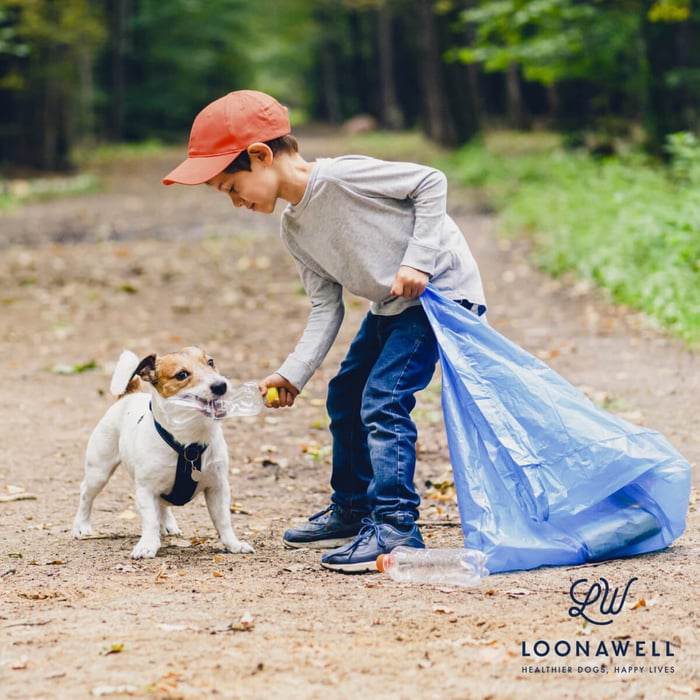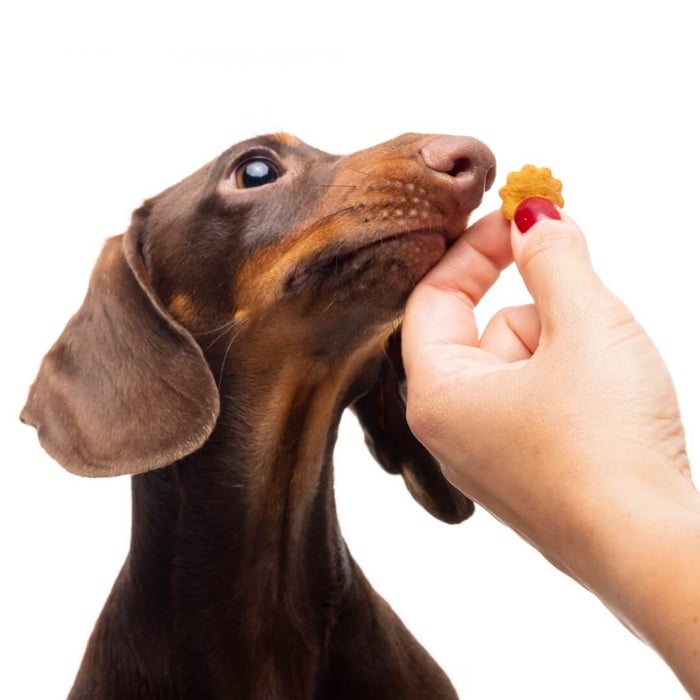Plastic: Is It A Threat To Our Dogs Now?
At LOONAWELL, we not only worry about your pet’s health, but also the environment in which your pet eats, plays and sleeps. It’s no news that plastic is an issue we have to deal with as a human race and the most evident aspect of why we should strive to decrease our plastic consumption is pollution. Plastic is invading oceans, animal habitats, and the biosphere in general. But this is not the only problem we need to solve. Plastic is a threat to our dogs and ourselves in many aspects.
Who uses so much plastic?
According to Statista, the Packaging industry is the sector responsible for producing the greatest share of plastic, followed by building and construction, and textiles in the third place.
Many companies around the globe have found plastic to be of great utility for packaging. Why is this? The main reason is that in many categories, plastic is the cheapest alternative. And cost reduction, unfortunately, is a main objective for many companies.
Not only is it cheap, but plastic is extremely durable, ideal for long shelf-life products, only degraded or transformed very slowly. Precisely a double-edged sword, don’t you think? But we are not only dealing with the lifespan of plastic and the need to recycle it, but also the presence of microplastic everywhere we go.
What are Microplastics?
Microplastics, the result of the degradation of plastic, can be found practically everywhere; in waters, the soil and even the air. Since plastic is so durable, it accumulates in large quantities in the environment. Some of these are so tiny we can’t see them, but we can breathe some of them in.
Many news outlets, including National Geographic and CNN, have reported that unexpected large quantities of microplastic were found falling in rain and carried in the air and rivers/lakes in the EU and many other parts of the world.
Can microplastics affect my health?
Science Direct has stated that being exposed to microplastics can cause toxicity, potentially leading to metabolic disturbances, neurotoxicity and increased cancer risk. Not only are we breathing and drinking them, so are our pets. What effect will this have on our pet’s health in the long run as well? Unfortunately only time will tell… if we don’t take action!
How much are we contributing as consumers?
Statista also reports that, on average, each person in the EU produces 33kg of plastic waste per year. It’s important to do our part to reduce the threat of plastic.
Does the Pet Food Industry contribute to plastic consumption?
According to Global PETS, in the Pet Food Packaging Market, plastics are the main packaging material (“representing 40,8% of the global pet food packaging market in 2017”). Why do so many companies choose plastic as their main packaging material? It’s cheap. As simple as that. Not to mention it’s convenient for shelf-life extension. With plastic packaging, and preservatives, unopened regular pet food has a shelf life of 12 – 24 months. Yes! That’s almost two years of food sitting there… without rotting. Sounds a bit disturbing, right?
What can we do about this?
Brands have a great responsibility when choosing their next packaging material, but so do consumers. Plastic only prospers in a product category when the consumer accepts, buys and doesn’t complain. As consumers we can say: IT’S ENOUGH!
Nielsen and The Conference Board conducted a survey in 2017 which showed that 75% of pet product consumers were willing to change their purchase habits to reduce their impact on the environment, even if it meant paying for a more expensive product. Imagine the positive impact that would have on our planet!
What we decided to do about this!
At LOONAWELL, we found a great balance between the responsibility towards a sustainable environment and the necessary preservation of our products. We took many aspects into account in the design and manufacture of our packaging.
As a number one rule in packaging we’ve decided to eliminate the usual plastic bag. Instead we opted for a non-conventional option. The boxes that hold our very convenient sachets come from sustainable forests (made to strict environmental standards). This means that they can not only be recycled, but that their production also leaves a low carbon footprint (1% versus 3.8% of plastic)
Our challenge was oxygen!
Since our products are 100% free of synthetic preservatives, we had to find our way around a packaging that would help maintain the freshness of our products. Our main enemy when it comes to the preservation of our organic treats is oxygen. Once we open our organic dog treats and they become in contact with oxygen, the fresh life of our products starts to deteriorate. This is why we chose to create small sachets which are not only extremely convenient but ensure the freshness of our natural dog biscuits.
Careful with your hands!
Oxygen isn’t our only enemy when we think about freshness and packaging, but also our hands. It is likely that in these times we have taken hand hygiene to a higher level, but let’s face it, we can’t make sure to wash our hands every time we give our dogs a treat. This is why LOONAWELL’s small sachets ensure that our hands don’t contaminate all the biscuits in the package, and make sure that our pups get the cleanest, freshest human-grade treat possible.
Our LOONAWELL individual sachets also allow for individual doses. Which means we know exactly how many treats we can give our beloved pups per day, ensuring accuracy, freshness and cleanliness.
We need to bear in mind that our sachets need to be disposed of, as the outer layer of kraft paper is coated with an inner aluminum layer. Unfortunately, this is a compromise. To be able to cook our delicious, organic dog treats, have them shipped over to your homes and arrive fresh, they need to be preserved in some way. You either use synthetic preservatives or you use a package that preserves. It’s one or the other. We chose to make organic products WITHOUT preservatives, and there isn’t a type of packaging in the market that allows for this and the possibility of recycling it.
Are you willing to be a part of that change as well?
The issue is not only wanting to change, but finding those alternatives. Up to now, there wasn’t an option that offered all that, but at LOONAWELL we decided to say ENOUGH, and create that product. We challenge you to try to find a product like LOONAWELL the next time you buy treats for your dogs. You’ll see that in other pet treats you will find either a plastic bag, or synthetic preservatives.
We all have to make compromises and try to find the best option. When you buy LOONAWELL, you’re not just buying a healthy dog treat, but you’re helping us reduce unnecessary plastic and ensure that this plastic isn’t a threat to our dogs. We need to support businesses going above and beyond and doing their best to ensure that they leave the smallest carbon footprint possible. We invite you to support our business in making healthier dogs, happy lives, and a healthy planet to the best of our abilities.
Dr. Maria de Bettencourt Tavares
CHF. 16.00
For vitality and healthy dog living. These organic treats are handcrafted and traditionally baked, with highly nutritious but low calorie ingredients. Perfect for dogs that want to live an active and healthy life. Organic and human-grade With apples, carrots, oregano,… Read More
CHF. 16.80
Rich in high quality protein, for your dog's health and vitality. These organic treats are handcrafted and traditionally baked, with an exquisite flavorful balance. Rich in protein, antioxidants, vitamins, minerals and prebiotics, for a dog's optimal health. Organic and human-grade… Read MoreMulti Vitamin Organic Baked Dog Treats

Beef Delight Organic Baked Dog Treats





